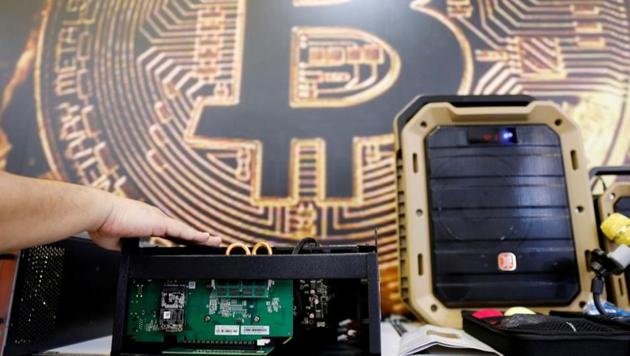Bitcoin could break the internet, says Bank for International Settlements
The BIS, an institution that serves as a central bank for other central banks, said cryptocurrencies are too unstable, consume too much electricity, and are subject to too much manipulation and fraud.A cryptocurrency mining computer is seen in front of bitcoin logo during the annual Computex computer exhibition in Taipei Taiwan.

A cryptocurrency mining computer is seen in front of bitcoin logo during the annual Computex computer exhibition in Taipei, Taiwan. (REUTERS)
The Bank for International Settlements just told the cryptocurrency world it’s not ready for prime time -- and as far as mainstream financial services go, may never be.
In a withering 24-page article released Sunday as part of its annual economic report, the BIS said Bitcoin and its ilk suffered from “a range of shortcomings” that would prevent cryptocurrencies from ever fulfilling the lofty expectations that prompted an explosion of interest -- and investment -- in the would-be asset class.
The BIS, an 88-year-old institution in Basel, Switzerland, that serves as a central bank for other central banks, said cryptocurrencies are too unstable, consume too much electricity, and are subject to too much manipulation and fraud to ever serve as bona fide mediums of exchange in the global economy. It cited the decentralised nature of cryptocurrencies – Bitcoin and its imitators are created, transacted, and accounted for on a distributed network of computers – as a fundamental flaw rather than a key strength.
one of its most poignant findings, the BIS analysed what it would take for the blockchain software underpinning Bitcoin to process the digital retail transactions currently handled by national payment systems. As the size of so many ledgers swell, the researchers found, it would eventually overwhelm everything from individual smartphones to servers.
“The associated communication volumes could bring the Internet to a halt,” the report said.
‘Disaster’
Researchers also said that the race by so-called Bitcoin miners to be the first to process transactions eats about the same amount of electricity as Switzerland does. “Put in the simplest terms, the quest for decentralised trust has quickly become an environmental disaster,” they said.
The BIS is weighing in at pivotal moment in the cryptocurrency story. Even as Goldman Sachs Group Inc., the New York Stock Exchange, and other institutions take steps to offer clients access to the new marketplace, the US Securities and Exchange Commission is cracking down on the offerings of new digital tokens, which it has found are rife with ripoffs. At the same time, cyber-attackers are hitting crypto exchanges regularly -- just last week, Bitcoin nosedived after a South Korean exchange reported it was hacked. It fell 0.9% to $6,438 as of 10.40 am in Sydney on Monday.
bank for other central banks
underpinning Bitcoin to process the digital retail transactions